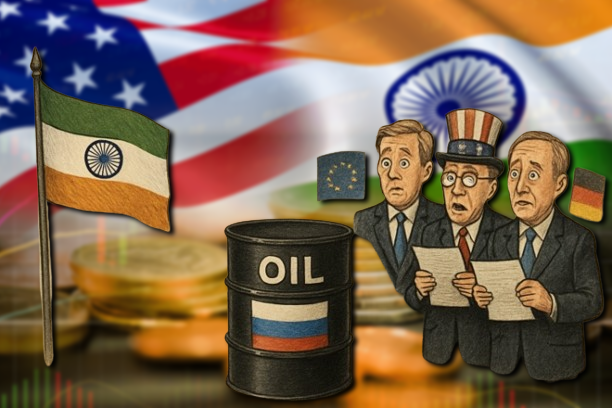
- India increased its energy imports from Russia after the Russia-Ukraine war began. Post-war, oil prices significantly rose across the globe, making Russian oil purchase an economically right choice for a developing country like India.
- The Ministry of External Affairs (MEA) released an official statement immediately calling out the hypocrisy of the U.S. and the EU.
- India pointed out that, in 2023, the EU had trade in services with Russia of approximately €17.2 billion and bilateral trade in goods worth €67.5 billion.
- The European imports of LNG also rose to 16.5 million tonnes in 2024, which was significantly higher than the 15.21 million tonnes imported in 2022, when the Russia-Ukraine war broke out.
The diplomatic clash between India and the West, following accusations made by the United States and the European Union against India, has entered a new episode with India’s strident response. In a calculated diplomatic stance, India has strongly responded to the claims that India has been indirectly financing the Russia-Ukraine war through the nation’s continued purchase of discounted oil from the Russian Federation. This allegation made by the West claimed that India’s massive energy imports from Russia don’t align with and undermine the sanctions imposed by the West. These sanctions aim to ensure that Russia’s military campaign in Ukraine terminates due to financial constraints that will arise from the Western boycott of Russia and Russian goods.
India, however, gave a sharp response to these allegations thrown at it. India’s statement was delivered in the language of National Interest, economic pragmatism and a pointed reference to the West’s conveniently showcased double standards. Diplomatic tensions escalated between the two when the US announced exorbitant tariffs on India and also made baseless allegations against it. India’s Ministry of External Affairs (MEA) released an official statement immediately calling out the hypocrisy of the U.S. and the EU. India increased its energy imports from Russia after the Russia-Ukraine war began. Post-war, oil prices significantly rose across the globe, making Russian oil purchase an economically right choice for a developing country like India.
India called out the U.S. and the EU, accusing India of importing energy and defence equipment whilst they were having economic and trade relations with Russia. India pointed out that, in 2023, the EU had trade in services with Russia of approximately €17.2 billion and bilateral trade in goods worth €67.5 billion. Additionally, India pointed out that these trade numbers of EU-Russia were higher than India’s total trade with Russia in that year or after. The European imports of LNG also rose to 16.5 million tonnes in 2024, which was significantly higher than the 15.21 million tonnes imported in 2022, when the Russia-Ukraine war broke out. The statement from the MEA also called out the hypocrisy of the US, stating that the US continues to import from Russia uranium hexafluoride for its nuclear industry, palladium for its EV industry, fertilisers, as well as chemicals.
Europe and Russia’s bilateral trade also includes transport equipment, chemicals, fertilisers, mining products, iron and steel, stated the Ministry of External Affairs. The US also imports uranium hexafluoride, palladium and fertilisers and chemicals like the EU. Taking into account the trade volume and data that already exists between the West and Russia, accusing India of its trade relations with Russia is immoral and unjust.
India’s statement was rooted in the benefit of the nation’s economy and the citizens’ interests. As a developing nation with the world’s largest population, its motive was to provide affordable energy to its citizens. This import, however, doesn’t constitute an imperative national consumption either. India’s statement resonated across the emerging economies and the Global South, where countries face similar hypocritical attitudes from the developed West.
Vibha Hareesh has a Bachelor’s Degree in International Relations from Jindal Global University. She has a strong interest in geopolitics, international relations, and security studies. Views expressed are the author’s own.
